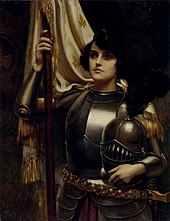The examples and perspective in this article may not represent a worldwide view of the subject. (May 2020) |




A hero (feminine: heroine) is a real person or a main fictional character who, in the face of danger, combats adversity through feats of ingenuity, courage, or strength. The original hero type of classical epics did such things for the sake of glory and honor. Post-classical and modern heroes, on the other hand, perform great deeds or selfless acts for the common good instead of the classical goal of wealth, pride, and fame. The antonym of hero is villain.[3] Other terms associated with the concept of hero may include good guy or white hat.
In classical literature, the hero is the main or revered character in heroic epic poetry celebrated through ancient legends of a people, often striving for military conquest and living by a continually flawed personal honor code.[4] The definition of a hero has changed throughout time. Merriam Webster dictionary defines a hero as "a person who is admired for great or brave acts or fine qualities".[5] Examples of heroes range from mythological figures, such as Gilgamesh, Achilles and Iphigenia, to historical and modern figures, such as Joan of Arc, Giuseppe Garibaldi, Sophie Scholl, Alvin York, Audie Murphy, and Chuck Yeager, and fictional "superheroes", including Superman, Supergirl, Spider-Man, Batman, and Captain America.
- ^ "Scholar and Patriot". Manchester University Press – via Google Books.
- ^ "Giuseppe Garibaldi (Italian revolutionary)". Archived from the original on 26 February 2014. Retrieved 6 March 2014.
- ^ Gölz, Olmo (2019). "The Imaginary Field of the Heroic: On the Contention between Heroes, Martyrs, Victims and Villains in Collective Memory". helden. heroes. héros: 27–38. doi:10.6094/helden.heroes.heros./2019/APH/04.
- ^ "Hero". Britannica Online Encyclopedia. Retrieved 2015-12-06.
- ^ "Definition of HERO". Merriam Webster Online Dictionary. Retrieved 2 October 2017.